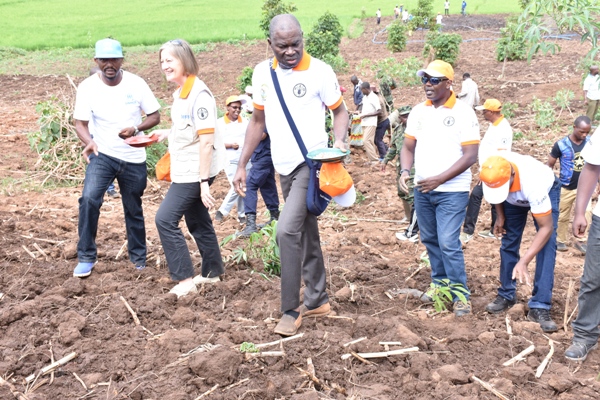
Food and Agriculture Organization of the United Nations (FAO) and the Ministry of Environment signed an agreement to implement two projects one aimed to identify bioenergy options suitable to the Rwandan context and another water governance, water accounting and water use efficiency.
During the signing ceremony, the Minister of Environment, Vincent Biruta, thanked the FAO for the support saying that it will complement the government’s efforts to impact use of bioenergy and on land restoration and environment.
“The Ministry of Environment is mainly concerned with energy from bioenergy required for cooking. However, biomass remains a serious issue needing appropriate intervention. We cannot increase the forest cover without addressing the issue of cutting down trees for fuel wood but also polluting the environment,” said Biruta.
Rwanda is heavily dependent on biomass energy. In fact, between 1990 and 2010 the country has lost 37 percent of its forest cover. According to Integrated Household Living Conditions Survey 5 (EICV 5), about 84% of households in Rwanda use firewood as their primary cooking fuel, and for lighting. On average, households consume around 1.8 tons of firewood per year to satisfy their cooking needs.
The FAO Representative in Rwanda, Gualbert Gbehounou said that besides the bioenergy project, there is need to address issues related to natural water resource management so to strengthen the country’s water governance for greater food security.
“Climate resilience is an important factor in effective water management. The projects will therefore look at how to maximize every drop of water there is, analyze and identify potential bioenergy feedstock and technologies that can be developed in Rwanda for both decentralized energy production and for cooking purposes,” said Gualbert.
During the implementation of the projects, FAO will work with national stakeholders including, the Ministry of Agriculture and Animal Resources, Ministry of Infrastructure, development partners and private actors.
About the projects
The first project “Bioenergy and Food Security Assessment and Capacity Building for Rwanda” will support the Ministry of Environment to identify which bioenergy options can be environmentally sustainable and contribute to the targets set within the Nationally Determined Contributions (NDCs). NDCs embody efforts by a country to reduce national emissions and adapt to the impacts of climate change. In addition, the project will also provide capacity building trainings on the use of the bioenergy tools to key stakeholders involved in the bioenergy sector and in the development of the Biomass Energy Strategy.
The second project “Knowing water better: Towards fairer and more sustainable access to natural resources for greater food security (KnoWat)” aims to strengthen water governance, water accounting and water use efficiency, for greater food security so that Rwanda is better prepared to adapt agriculture to climate change, water scarcity and increased competition for water resources in an equitable and sustainable manner. The project will support three countries, Rwanda, Senegal and Sri Lanka.
What is sustainable bioenergy?
Sustainable energy refers to energy that is accessible, cleaner and more efficient to achieving economic development and poverty reduction targets. Bioenergy is energy from biofuels. Biofuel is fuel produced directly or indirectly from biomass. Biomass is material of biological origin, for example wood, dung or charcoal and it excludes material embedded in geological formations and transformed to fossils.
Bioenergy and food security interlinkages
Bioenergy can be generated from all agricultural products and can be used for heating, cooking and lighting. For instance, a household can use manure of the livestock to produce green fuel for cooking and lighting. The manure can be used to get fertilizer for crops thus increasing food for consumption and for the market to earn income.
Bioenergy if managed sustainably and efficiently can bring in resources and boost productivity while improving food security. Bioenergy sector can create a new market for producers as well as offer new forms of employment that will positively affect agricultural and rural incomes, poverty reduction and economic growth.
Also, bioenergy has the potential to contribute to environmental objectives including the reduction of greenhouse gas emissions. (End)
